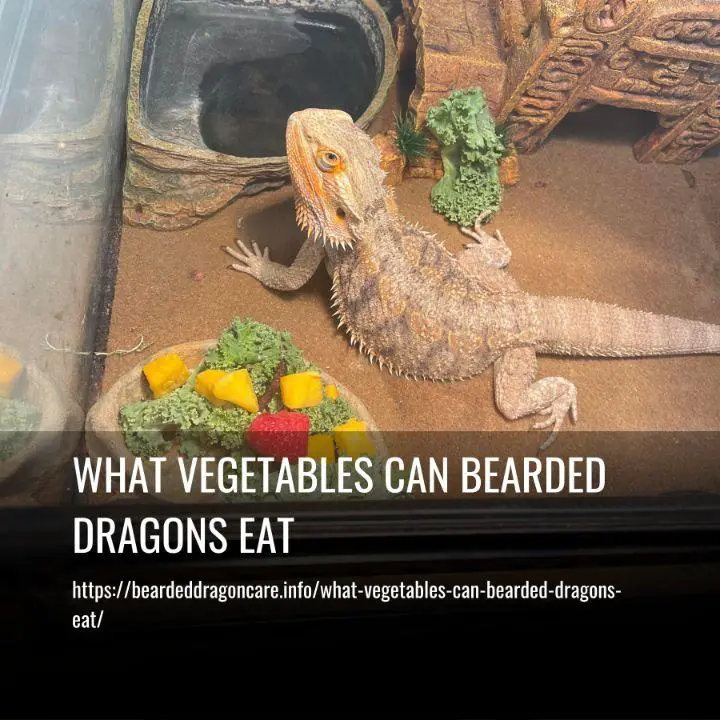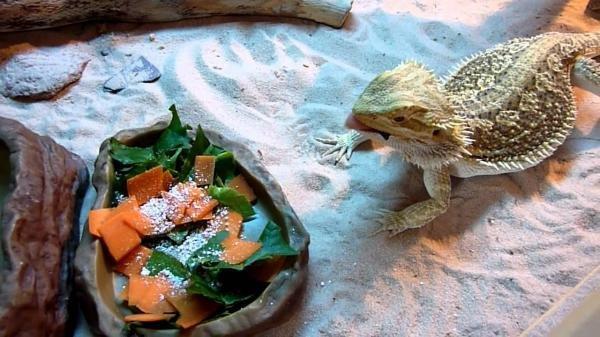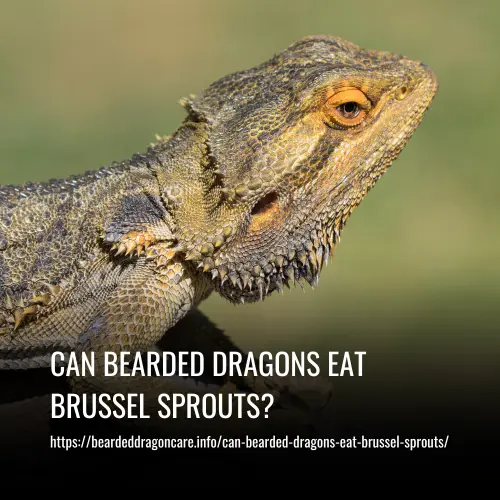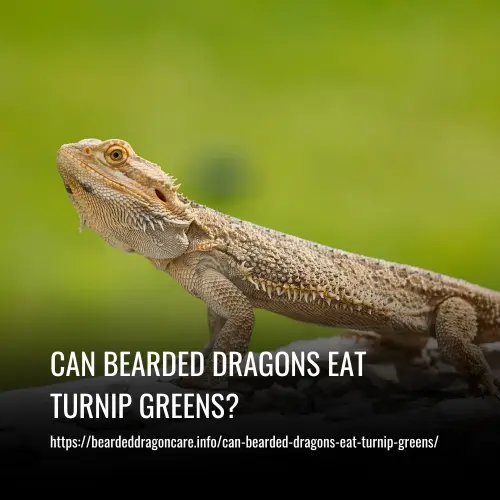Bearded dragons (Pogona Vitticeps) can be great pets, but they require special care and dietary requirements. Most people think that bearded dragons only eat crickets, however, this is far from the truth.
Bearded Dragons are omnivores and enjoy both animal and vegetable matter in their diet. With the right foods, your bearded dragon can have a varied and interesting diet.
Vegetables are an important part of their diet, so it’s important to know which greens will ensure your bearded dragon gets all the nutrition they need. In this article we will look at what vegetables your beardie can eat – so read on to find out!

What Vegetables Can Bearded Dragons Eat?
Bearded Dragons are becoming increasingly popular as a pet for many households in the United States. Making sure that your pet reptile is provided with a healthy diet is important to both the health and life span of your Beardie. Fortunately, bearded dragons can consume a variety of vegetables, making it easy to provide them with enough nutrition while keeping their diet interesting.
Vegetables that your Bearded dragon may eat include dark leafy greens like kale, mustard greens, and collard greens; squash and zucchini; bell peppers; sweet potatoes; okra; carrots; bok choy; Brussel sprouts and many others. Fruits should only be given to them sparingly as they are high in natural sugars which can cause health problems over time if eaten too frequently.
What Kind of Food Does a Bearded Dragon Eat?
Bearded Dragons are omnivores, which means that they need both plant and animal matter to thrive. While still young, Bearded Dragons should mainly be fed insects for 80% of their diet, with 20% vegetables. Even so, many owners find that their pets at this stage refuse veggies altogether.
Once your pet is fully grown, however, you’ll need to adjust its diet to include 80% vegetables and only 20% insects. This will ensure that your pet is getting all the nutrients it needs for a long and healthy life!
What Veggies Can Bearded Dragons Eat?
Bearded Dragons can eat a variety of vegetables, including dark leafy greens like kale, mustard greens, and collard greens; squash and zucchini; bell peppers; sweet potatoes; okra; carrots; bok choy; Brussel sprouts and many others.
Broccoli
Broccoli is an ideal vegetable for your bearded dragon. It has a wealth of vitamins and minerals, including Vitamins A, C, and K, fiber, protein, and calcium. And since it’s low in fat, you can feed it to your beardie without worry.
When preparing broccoli for your pet lizard, you want to chop it into small pieces to prevent choking. Start by cutting away just the green flowery part and steer clear from the stem or stalk–these are usually more difficult to chew on and may cause a choking hazard. Then just place the tiny bits on the food dish as part of a salad with some collard greens and strawberries. Your bearded dragon will love it!
Collard Greens
Collard greens, an increasingly popular and healthy leafy green vegetable, have a delicious flavor. With an abundance of essential vitamins, fiber, and calcium, they’re a great addition to any person or bearded dragon’s diet. What’s more, these greens have low calories, fat, and sugar content – making them an even more attractive option for anyone looking for nutrients without too much fat or sugar.
Not only are collard greens incredibly healthy for us, but they can also offer huge health benefits! From promoting heart health to reducing inflammation and even protecting against cancer, there is so much to gain from adding these wonderful vegetables to our diets.
In addition, consuming collard greens can help reptiles avoid the development of metabolic bone disease due to their high calcium content.
Beet Greens
Beet greens are a nutritious snack for your beardie, as they provide vitamins A, C, and K, as well as fiber and calcium. Both the leaves and stems of the greens are safe for your bearded dragon to munch on, however, it’s important to make sure you wash them thoroughly beforehand – this will eliminate any dirt or nasty pesticides that may have been present.
You can also give them cooked beet greens too – just don’t forget to let them cool down before serving! While these greens for great for your dragon’s health, bear in mind that you should only give them in moderation because they contain oxalates which bind minerals like calcium, preventing them from being absorbed.
Cucumber
Cucumber is a great food for your pet reptile. It is made up of almost entirely water content – about 96% – and has next to no fat. In addition, cucumber contains a range of vitamins and minerals, including Vitamin C and fiber which can help strengthen their immune system and prevent constipation.
One good way to feed it to your pet reptile is by washing the cucumber thoroughly before cutting it into small pieces, as large chunks could be a choking hazard. Treats or meals should also be monitored – you can offer a cucumber as part of or both once every other week but make sure not to give them too much.
Mustard Greens
Mustard Greens are an ideal food for bearded dragons because they are full of flavor, nutritious, and contain a healthy Phosphorus to Calcium ratio. A, C, and K vitamins are essential for bone growth and help blood clot normally; these vitamins are supplied by them. And since they are so low in calories and fat, they make a great snack for your Beardies.
The bitter taste of Mustard Greens can also be used to stimulate the appetite of reluctant eaters. However, caution needs to be taken when feeding these greens as they have oxalic acid content which should not be served in excessive amounts. So keep an eye out on portion sizes to ensure that your pet is getting the nutrients they need without overfeeding them.
Cilantro
Cilantro is a great addition to the diet of your bearded dragon. It’s packed with essential vitamins, minerals, and nutrients that will help keep your reptile healthy and happy. Plus, its strong and distinctive flavor can add a unique taste to their meal.
However, it’s important to remember that too much at once can lead to digestive issues, so make sure you only feed small amounts at a time and select fresh produce that hasn’t been exposed to pesticides or other chemicals. If ever unsure how much cilantro is an appropriate amount for your reptile companion, don’t hesitate to reach out to a professional for advice!
Turnip Green
Turnip greens are a leafy green vegetable that packs quite the nutritional punch. They contain vitamins A, C, and K, as well as fiber and calcium which are important for a bearded dragon’s bone health. The bitterness of the turnip greens actually provides most dragons with an extra incentive to eat them. The leaves and stems are safe for your little friends to munch on but make sure to give them a thorough washing as dirt and pesticides can hide in these vegetables.
Bearded dragon owners should treat their pet’s diet with care and include turnip greens into it a few times per week for proper nutrition balance. According to VCA Hospitals, this is enough to provide your scaly pal with the nutrients they need for overall good health.
Parsley
Parsley is the perfect veggie for your bearded dragon. Loaded with vitamins A and C, plus calcium and iron, it has everything your pet needs to be healthy. Not only that, but the natural breath freshener qualities of parsley will keep their enclosure smelling fresh.
It’s also a great source of chlorophyll which helps keep toxins away from your bearded dragon’s system. But when it comes to oxalates–which can cause kidney issues when over-consumed–parsley is low enough so it can still be fed to your beloved reptile in moderation.
This nutritious veggie is definitely something you should consider adding to your pet’s diet on a regular basis!
Kale
Kale is a powerful leafy green vegetable that is full of essential vitamins and minerals. It’s packed with Vitamins A, C, and K, as well as lutein and zeaxanthin which are essential for solid eye health.
Bearded dragons can consume kale in both cooked and raw form! If you’re feeding your beardie cooked kale, make sure it’s well-cooked but not overcooked as cocking it too much can make the food hard for them to digest.
Overall, adding Kale to your bearded dragon’s diet is a great way to ensure they’re getting all the necessary nutrients needed for a happy and healthy life!
Watercress
After reading about the benefits and risks of watercress, you may be wondering if it’s worth adding to your diet. The answer is yes! Watercress is a delicious and nutritious leafy green vegetable with many health benefits. It’s high in essential vitamins and minerals like vitamins A, C, and K, calcium, iron, manganese, folate, potassium, and magnesium.
It’s important to note that while watercress is safe for bearded dragons to eat in moderation due to its high oxalates content which can bind to certain minerals in the gut and limit their absorption. As long as your bearded dragon gets enough of other beneficial minerals from their diet then it should have no problem-consuming watercress.
Sweet Potatoes
Sweet potatoes are a nutritious vegetable for your bearded dragon. Laden with beta carotene, vitamin A, fiber, potassium, and vitamins B and C – sweet potatoes are an excellent dietary choice for your beloved pet! Although they contain high amounts of water, that doesn’t subtract from the nutritional value.
You can feed them to your furry buddy as an occasional treat in a variety of ways. Whether it be simple roasting, mashing, or pureeing – the choice is yours! Just make sure you remove the skin before you do so. Feeding your beardie sweet potatoes will aid their growth and vision in turn making them healthy and strong!
Green Beans
Green beans are an excellent food choice for your bearded dragon! Not only are they full of essential vitamins and minerals like A, C, and K, but they also contain fiber and folate which are essential for good health. Plus, green beans have a low-calorie, low-fat content which makes them perfect for bearded dragons as they require diets that are rich in protein but low in fats.
Lastly, green beans come packed with calcium which is necessary for strong bones and overall health. So if you’re looking to give your pet the best nutrition possible, look no further than green beans!
Mushrooms
Although mushrooms are often mistaken for fungi, they are actually types of vegetables. Mushrooms are low in calories and fat, yet still provide essential vitamins, minerals, and other nutrients. In particular, they contain plenty of potassium, copper, and selenium.
And if you own a bearded dragon, mushrooms can be a great addition to their diet. Not only do the reptiles need the fiber and protein that mushrooms offer, but they also provide them with textural complexity and flavor variety to help keep them healthy and happy. So whether you’re eating mushrooms as a snack or feeding them to your pet reptile, make sure you enjoy every bite!
Red And Green Cabbage
Red and green cabbage are a great source of nutrition for bearded dragons. These nutrient-rich veggies provide vitamins A, C, and K and sulfur compounds that help to detoxify the body. Additionally, cabbage is a good source of fiber to maintain your beardie’s digestive system.
For your bearded dragon’s meal, it is best to cut cabbage into small pieces. It can be served either raw or lightly steamed and should be offered in moderation as part of a varied diet for the best nutrition. Red and green cabbage are key ingredients to make sure you’re providing your reptile with the important vitamins they need while giving them something they enjoy too!
Carrots
Carrots are a great treat for your bearded dragon! They come in a variety of colors, such as orange, white, yellow, and purple, and they’re absolutely delicious. Not only that, they contain some very valuable vitamins and minerals.
One of the most important is beta-carotene which is converted into vitamin A in the body; this vitamin is essential for vision and immune functions. There’s also fiber to help promote digestive health.
It’s best to cut them into small pieces so there are no choking hazards and you can even steam or cook the carrots before feeding them to make them softer. So if you want to boost the nutrition of your furry friend, carrots are a great way to do it!
Peas
Peas are a popular vegetable that is full of nutrition and benefits for your bearded dragon. They’re low in fat and calories, yet high in vitamins, minerals, fiber, and protein – making them an excellent choice for your beardie.
The most impressive thing about peas is their incredibly high vitamin A, C, and E content which helps maintain your pet’s overall health. Additionally, the high fiber content of peas helps to boost digestion while providing a natural source of moisture which keeps your dragon hydrated.
To make them as easy as possible to digest, peas should always be cooked before feeding them to your pet – you can also mash or puree them so it’s even easier for the beardie to eat. If you’re looking for a nutrient-rich snack for your pet then look no further than peas!
Sprouts
Many people overlook sprouts, but they can be incredibly beneficial vegetables. Our beloved bearded dragons can take advantage of these too! Sprouts contain an impressive amount of vitamins, minerals, and antioxidants. Plus, being low in calories and fat makes them a great nutritious option for those concerned about their pet being overweight.
On top of that, sprouts also boast an array of essential vitamins and minerals to support your pet’s well-being and overall health. The dietary fiber offered by sprouts is useful in aiding digestion as well as regulating it. All in all, sprouts really do pack a punch when it comes to nutrition – something everyone should take note of!
Bell Peppers
Bell peppers are one of the best vegetables you can give your bearded dragon. Not only are they low in calories and fat, but they’re also high in fiber and a great source of many different vitamins, minerals, antioxidants, and other beneficial nutrients.
For instance, bell peppers contain vitamins A, C, and E as well as carotenoids and flavonoids that have been proven to reduce the risk of cancer. What’s more, bell peppers can also help improve vision, lower blood pressure, reduce inflammation, and boost the immune system. With so many fantastic benefits it’s no wonder why bell peppers are such an important part of any bearded dragon’s diet!
Kohlrabi
Kohlrabi is an incredibly nutritious vegetable that belongs to the same family as cabbage. It’s a great source of vitamins C and K, which are essential for maintaining a strong immune system, reducing inflammation, and supporting your cells.
Kohlrabi is an excellent option if you’re looking to maintain a healthy diet because it’s low in calories.
And with its generous amounts of water content, kohlrabi can keep your dragon hydrated! Plus, its crunchy texture helps clean teeth and keep gums healthy. In short, kohlrabi has some excellent nutritional benefits that should not be overlooked!
Best Greens Bearded Dragons Can Eat: Occasional Staples
Bearded dragons need a variety of greens and vegetables in their diets, but it’s important to make sure that you are choosing the best options. While some greens can be eaten daily, there are others that should only be eaten occasionally due to the presence of phosphorus, oxalates, or goitrogens.
Some of the best occasional greens for bearded dragons include bok choy, basil, green cabbage, napa cabbage, celery leaves, cilantro, grape leaves, kale, kohlrabi, lemongrass, pea sprouts, rosemary, and watercress. These greens offer essential vitamins and minerals such as vitamins A and C, fiber, calcium, iron, potassium, manganese, magnesium, and folate. Aside from offering these nutrients they also feature anti-inflammatory and antimicrobial properties.
It’s important to keep in mind that each dragon has different nutritional needs and requirements so do your research before incorporating any new food items into their diet. Lastly, if you opt for vegetables like celery or lemongrass be sure you chop them extra small to avoid the possibility of your dragon choking on them!
What Veggies Can Bearded Dragons Eat Every Day?
Bearded dragons need a healthy, balanced diet of vegetables that provide optimal calcium-to-phosphorus ratio.
Cactus pads or prickly pear have a great calcium-to-phosphorus ratio of 2.3 to 1 and are also high in antioxidants and vitamins. To serve it, cut away the outer thorned coating and cut it into small pieces.
Collard greens have an outstanding calcium-to-phosphorus ratio of 14.5 to 1 and are rich in vitamins A, C, E, and K. Dandelion leave also have a great ratio of 2.8 to 1 and they’re rich in calcium and Vitamin A – just make sure they’re pesticide-free!
Endive or escarole both provide texture and nutrients with a ratio of 1.9 to 1, while Mustard Greens bring flavor with their 2.4 calcium to phosphorus ratio along with certain vitamins; just serve them with other greens that are high in calcium!
Lastly, Turnip Greens boasts a stunning 4.5 calcium to phosphorus ratio as well as some essential vitamins; though they contain high levels of oxalates, their health benefits outweigh the risks when served with other oxalate-free greens high in calcium!

Common Feeding Mistakes
When it comes to feeding a bearded dragon, there are some common mistakes that people often make. These can lead to a variety of health issues, not to mention obesity.
For starters, it’s easy to overfeed them. While they naturally have quite the appetite, an adult should only be fed no more than twenty insects in a day. Otherwise, obesity is almost certain – leading eventually to heart and joint problems.
Another mistake would be feeding juveniles mealworms. Due to their outer shell which is made of chitin, those under the age of 18 months aren’t able to digest this food properly. Substitute with super worms when your bearded dragon reaches this age instead.
Finally, don’t forget to gut-load your live insects at least one day before feeding them! This process involves giving them fruits and veggies that are dense in nutrients so that your pet will also get enough nutrients from consumption. If you don’t do this step beforehand then your beardy won’t receive all of the nutrition she needs!
What Can’t Bearded Dragons Eat?
It is important to avoid certain foods when providing nourishment for your bearded dragon. Things like avocados, beef, bread, chicken, eggplant, fireflies, fish, garlic/onion, iceberg lettuce/celery, and spiders/ticks can all cause a variety of health problems or simply be toxic for your beardie.
It’s important to note that bearded dragons don’t normally eat meat in the wild – so they should never be given meat or fish as part of their diet in captivity. These protein sources contain too much fat and phosphorus which can put a strain on their digestive system over time. Stick to the safer veggies and fruits instead!
Poison for Bearded Dragon:
Bearded Dragons have very specific dietary needs, and it’s important to be aware of what foods are safe for them to consume. Unfortunately, there are some plants that can be poisonous to Bearded Dragons if they eat them.
The most dangerous is avocado, as this can cause liver or another organ failure in your dragon. Onions are also considered to be toxic food for dragons. Additionally, vegetables with a lot of moisture such as cucumber and cactus should not be given to dragons as they tend to make it difficult for dragons to grab these vegetables with their tongues.
Finally, some people may think it’s okay to feed spinach, kale, or lettuce but both spinach and kale contain calcium-binding substances (oxalates) which could hurt rather than nourish your dragon so should be avoided altogether. Lettuce can also potentially give your bearded dragon diarrhea and should only really be used as a last resort if your dragon is severely dehydrated or constipated.
Conclusion:
Bearded dragons need a varied diet that includes both insects and vegetables. While many popular vegetables are suitable for bearded dragons, a variety of dark leafy greens and fruits should be provided as well. Keeping in mind that vegetables should only be fed sparingly and gut-loaded insects should be the main component of their diet will ensure your dragon remains healthy and thriving.

